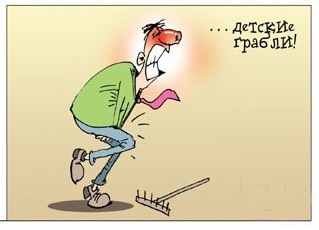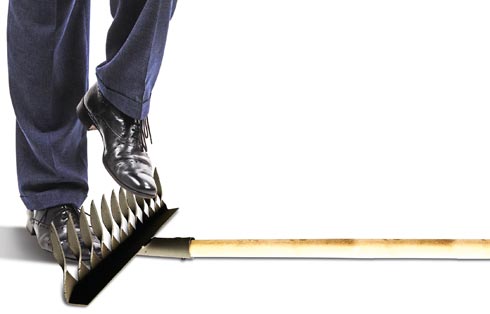Ботаник
Today you’ll learn: Russian slang for “nerd”, what the Russian school grade system is like, and, as a bonus, an expression “to step on the same rake”. Let’s begin!
Всем очередно́й большо́й приве́т!
A new big hello to everybody!
Нет, сего́дня мы говори́м не об учёных и про́чих люби́телях приро́ды. Бота́ник, и́ли по́просту бо́тан, э́то тот, кто все свои́ ю́ные го́ды прово́дит за учёбой, в то вре́мя как его́ све́рстники предпочита́ют отрыва́ться и набира́ться жи́зненного о́пыта, натыка́ясь на свои́ со́бственные гра́бли.
No, today we are not talking about scientists and other lovers of nature. The ‘ботаник’, or simply ‘ботан’ (nerd), is the one who spends all his youth studying while his peers prefer to break away and gain life experience stepping on their own rakes.
Гра́бли – э́то садо́во-па́рковый инструме́нт для убо́рки му́сора с газо́нов, наприме́р – упа́вшей листвы́. Натыка́ться на гра́бли – распространённое выраже́ние, и коне́чно, употребля́ется в перено́сном смы́сле. Предста́вьте себе́ челове́ка, наступи́вшего на гра́бли – деревя́нная рукоя́тка лети́т ему́ пря́мо в лоб. Мора́ль: не наступа́й на гра́бли – полу́чишь по башке́ (по голове́, то есть).
‘Rake’ is a garden and park tool for cleaning lawns from garbage, for example, fallen leaves. ‘To step on a rake’ is a widely used expression, and of course, it is used in a figurative sense. Imagine a man stepping on a rake – a wooden handle flies directly to his forehead. Moral: do not step on the rake, you will get hit in the “башка” (i.e. head).
Таки́м о́бразом, смысл выраже́ния натыка́ться на гра́бли приме́рно тако́в: де́лать оши́бки, что́бы учи́ться на них и не повторя́ть их в бу́дущем.
Thus, the meaning of the expression ‘step on a rake’ is roughly this: make mistakes to learn from them and not repeat them in the future (don’t step on the same rake).
Но вернёмся к бота́никам…
But let’s go to botanists …
Пери́од бота́ничества начина́ется ещё в шко́ле и продолжа́ется в студе́нческие го́ды. Когда́ я учи́лась в шко́ле, мы таки́х называ́ли зау́чка, от сло́ва “учи́ться”. Отноше́ние к ним всегда́ двоя́кое – с одно́й стороны́ их гнобя́т (то есть вся́чески по́ртят им жизнь, как физи́чески, так и мора́льно) за то, что они́ “други́е”, с друго́й стороны́ – у них, как пра́вило, всегда́ мо́жно списа́ть дома́шнее зада́ние. Хотя́ осо́бенно вре́дные, я по́мню, спи́сывать не дава́ли, но их за э́то ещё бо́льше гноби́ли.
The period of “botany” begins at school and continues in the student years. When I was in school, we used to call them “заучка”, from the word “учиться” (to learn). Attitudes towards them are always twofold – on one hand they are trolled (i.e. their lives are spoiled in every way, both physically and morally) because they are “different”, on the other hand – you can alwasy copy the homewwork from them. Although especially bad ones, I remember, did not give to copy the homework, but they were even more trolled for that.
Одна́ко, бо́тан бо́тану рознь. Т.е. бо́таны бывют ра́зные, и в то вре́мя как одни́ действи́тельно хвата́ют пятёрки, други́е получа́ют ста́тус бо́тана исключи́тельно за свой вне́шний вид и мане́ру держа́ться.
However, there are different kinds of nerds. Nerds are different, and while some really “grab the fives” (get the best grades), others get the status of a nerd solely for their appearance and the manner of hold themsleves.
К сло́ву о ру́сских шко́лах. Вы заме́тили, чуть ра́нее я сказа́ла хвата́ют пятёрки, т.е. получа́ют пятёрки. В Росси́и при́нята пятиба́лльная систе́ма оце́нок: 5, и́ли пятёрка – э́то вы́сший балл, соотве́тственно 1, едини́ца, и́ли кол – ни́зший.
By the way, about Russian schools. You noticed, a little earlier I said “grab the fives”, i.e. get the “fives”. In Russia, a five-point grade system is adopted: 5, or the “five” is the highest score, respectively 1, one, or ‘кол’ (stake) – the lowest.
Как пра́вило, е́сли ребёнок у́чится без тро́ек, т.е. на 4 и 5, то он уже́ явля́ется предме́том го́рдости роди́телей. Колы́ (едини́цы) ста́вят ре́дко, дво́йка – э́то наибо́лее популя́рная оце́нка за плоху́ю успева́емость. Тех, кто получа́ет дво́йки называ́ют дво́ечниками и мо́гут оста́вить на второ́й год, т.е. заста́вить ребёнка ещё раз отучи́ться в како́м-нибу́дь кла́ссе. Таки́х называ́ют второго́дниками.
As a rule, if a child studies without “3s”, i.e. receives 4 and 5, then he is already a source of pride for his parents. “Stakes” (ones) are given rarely, “two” is the most popular grade for poor performance. Those who receive “twos” are called ‘D-students’ and can be made to repeat the year (i.e. to make the child to study again in some [the same] class). These are called ‘repeaters’.
Е́сли учени́к получа́ет то́лько пятёрки, то его́ называ́ют кру́глым отли́чником.
If a student receives only “fives”, then he is called a ’round honors student’.
Ну, пожа́луй на сего́дня доста́точно. Напосле́док, напо́мню вам, что учи́ться никогда́ не по́здно, хотя́, раз вы слу́шаете э́тот подкаст, вы и без меня́ э́то прекра́сно по́мните. 🙂
Well, perhaps it’s enough for today. To finish with, I’ll remind you that it’s never too late to learn, although, since you’re listening to this podcast, you remember it perfectly well without me. 🙂
Уда́чи и до сле́дующей встре́чи!
Good luck and see you next time!

Subscribe to our basic newsletter and receive notifications about new episodes of Very Much Russian podcast.
Or subscribe to our premium newsletter to receive both the basic newsletter and all our previous podcast episodes, one by one, on a regular basis.
Today's vocabulary
-
ботаник / ботан
Russian slang[ba-tA-neek / bO-tan]nerd, grind, wonk, swot -
натыкаться на грабли
Russian idioms[na-ty-kA-tsa na grAb-lee]~ to cause a backlash, to drop a brick (lit. - to stumble on a rake) -
заучка
Conversational Russian[za-Uch-ka]nerd, grind, wonk, one who always studies (comes from the verb "учить") -
башка
Conversational Russian[bash-kA]head, noddle, pate, chump







